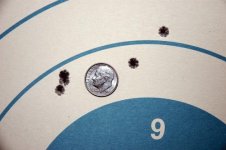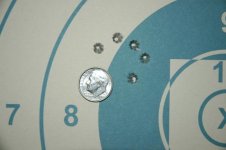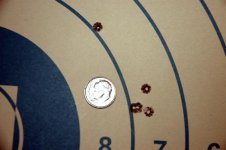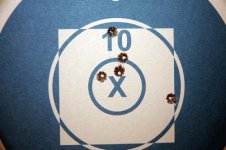Just curios as to why most all 600 yard shooters run 29 to 31 inch barrels? This seems real popular with the 6BR and BR improved chamberings. I do understand you will gain a little velocity using the longer barrels but dont you give up some rigidity y using such a long tube? The gain in velocity from a 26 to 29" barrel cant be much more than 20 to 25 fps is it? Or is it that you want that longer barrel because it does whip a little more? I guess it might be a bit easier to tune? Truth is i really dont know. Is this simply a matter of velocity? Like i say, just curios. Lee
You are using an out of date browser. It may not display this or other websites correctly.
You should upgrade or use an alternative browser.
You should upgrade or use an alternative browser.
Why such long barrels?
- Thread starter skeetlee
- Start date
P
passion4shootin
Guest
While shorter barrels are stiffer, long barrel gives the shooter the ability to setback his
barrel once or twice or even redo the muzzle if the barrel is a shooter. By the looks of the long barrels where I shoot BR, it doesn't seem to be a handicap. Just my .02 cents.
Ed
barrel once or twice or even redo the muzzle if the barrel is a shooter. By the looks of the long barrels where I shoot BR, it doesn't seem to be a handicap. Just my .02 cents.
Ed
R
rcw3
Guest
While shorter barrels are stiffer, long barrel gives the shooter the ability to setback his
barrel once or twice or even redo the muzzle if the barrel is a shooter. By the looks of the long barrels where I shoot BR, it doesn't seem to be a handicap. Just my .02 cents.
Ed
Not trying to dispute what you are saying, but I never understood the set back logic because usually about the time you might consider a set back, the lands show a good bit of blistering/crackling for 6" or more up the bore, so I never understood why cutting 2" or so off the barrel was of any value. I do think 30" gets you about all you will realistically get out of a BRX or Dasher (maybe with an inch or two two spare).
Robert
rooshooter
New member
I have been wondering about differences in tunability with long skinny Vs short thick (well 28" straight Vs 31" tapered).
What are your thoughts on tune with different contours? Does a 28" straight barrel have smaller but closer spaced vibrations while a 31" tapered barrel has bigger but further apart vibration nodes? Excuse my lack of technical terminology.
What are your thoughts on tune with different contours? Does a 28" straight barrel have smaller but closer spaced vibrations while a 31" tapered barrel has bigger but further apart vibration nodes? Excuse my lack of technical terminology.
M
matts52
Guest
long barrels????
I feel the shorter barrels tune easier and stay tuned.My 300wsm's all seemed to shoot better at 28"than30"???That includes my old HG which consistantly was a 4" gun at 1000k.
Why do the ppc shooter use 19-21" tubes?It aint the weight issue.with dashers and br's I'd say 28" is the longest I'd go.JMo.
MattD
I feel the shorter barrels tune easier and stay tuned.My 300wsm's all seemed to shoot better at 28"than30"???That includes my old HG which consistantly was a 4" gun at 1000k.
Why do the ppc shooter use 19-21" tubes?It aint the weight issue.with dashers and br's I'd say 28" is the longest I'd go.JMo.
MattD
G
Greg Culpepper
Guest
Not trying to dispute what you are saying, but I never understood the set back logic because usually about the time you might consider a set back, the lands show a good bit of blistering/crackling for 6" or more up the bore, so I never understood why cutting 2" or so off the barrel was of any value. I do think 30" gets you about all you will realistically get out of a BRX or Dasher (maybe with an inch or two two spare).
Robert
Robert,
I'm coming down on Passionforshootin's side on this one. I've had some very happy experience with shortening and re-chambering good barrels at the end of their competitive life. I agree that it doesn't make sense to cut two inches off a barrel that suffers six inches of fire cracking. But a barrel like that many times past any accuracy as we describe it. I'll give you a current example in my inventory. The barrel being discussed (8 twist Kreiger) started life almost ten years ago as a 30" 6-250 imp. It shot pretty good at the Hickory Egg Shoot and I started using it at both 600 yd for light and heavy and as a 15 pound heavy gun at 1K. At Hawks Ridge in 2003 it finished 4th for HG Score in the ten match agg, the only gun in the top ten that wasn't a 30 cal. In 2004 at 600 it set the LG group and HG score IBS records, all using Clinch Rivers. After about 1800 rounds it was well past its accurate life and I set it aside. Several years later I pulled it out and had Mark King chamber it again, this time in a 0.272 6BR. at 27", for my step daughter. I took it and her ammo (Sierras) to a match at Piedmont (untuned) and it did really well so I kept using it. I've been using it for more than three years and I still haven't felt pressed to change the load. Before the last match I shot at Piedmont (June) I had shot another 2500 rounds or so and went at the throat with Clover abrasive to loosen up the fire cracking constriction. I've attached two HG and two LG targets from that match in the hope of persuading you to give a shortened barrel a whirl.




The round groups are from the mild conditions morning HG match and are 108 Bibbs (first time I've tried them) and the three in one and four in a knot groups are afternoon shot in heavy mirage ( 5" jitterbug) with Sierras, pointed (Whidden) but otherwise out of the box. The Bibbs group may have been under an inch but that four and one is what makes me need to scream.
Like others on this thread I think 30" is unnecessary for a BR or similar expansion ratio case but it doesn't hurt a thing and it leaves an opportunity to stretch the life of a barrel that's been good to you.
Regards,
Greg
Last edited by a moderator:
R
rcw3
Guest
Greg
I am happy to hear you have done well with set backs - it's great when it works out like that.
I feel I need to add a little more to my posting above.
Over the last 5 years or so I have had probably 8-10 barrels set back and re-chambered, and it typically has turned out to be about a 50/50 situation, and for all that is involved doing set backs, setting up the rifle again, doing load testing and work ups with a set back barrel, those odds are not worth it to me (unless one is making a barrel up for fire forming, or some other type of testing where the best accuracy possible is not perceived as being needed).
I also start out with somewhat of a view "if it ain't broke, don't fix it" in that if I have a barrel that is an excellent shooter, I will keep it and use it until it ceases to perform (i.e. why mess with something that is 100% - it's like asking for trouble). You are correct, that by the time those barrels cease performing, cutting an inch or two off the breech end just does not seem to solve the extent of the barrel wear and tear. When I look at my Dasher and BRX barrels after 600-800 rounds, I see stuff going on a lot more than just 1" - 2" up the bore.
Typically what has wound up getting set back for me have been barrels that for one reason or another have not worked out well and are not being shot or used, and I am hoping to get a project going without having to buy a new barrel. Maybe that's why the odds turn out about 50/50 for me, in that those barrels were not known as being great to start with and maybe nothing will make them great (i.e. there's a little bit of "luck of the draw" with barrels, even the best).
"Throwing good money after bad" is most annoying and I have been down that road a few times with set backs, setting a rifle up again, doing load work ups and testing, and after a couple hundred rounds and a multiple trips to the range determined that it was all a waste (again). From that perspective, these days I am more inclined to take my chances with a new barrel.
Robert
I am happy to hear you have done well with set backs - it's great when it works out like that.
I feel I need to add a little more to my posting above.
Over the last 5 years or so I have had probably 8-10 barrels set back and re-chambered, and it typically has turned out to be about a 50/50 situation, and for all that is involved doing set backs, setting up the rifle again, doing load testing and work ups with a set back barrel, those odds are not worth it to me (unless one is making a barrel up for fire forming, or some other type of testing where the best accuracy possible is not perceived as being needed).
I also start out with somewhat of a view "if it ain't broke, don't fix it" in that if I have a barrel that is an excellent shooter, I will keep it and use it until it ceases to perform (i.e. why mess with something that is 100% - it's like asking for trouble). You are correct, that by the time those barrels cease performing, cutting an inch or two off the breech end just does not seem to solve the extent of the barrel wear and tear. When I look at my Dasher and BRX barrels after 600-800 rounds, I see stuff going on a lot more than just 1" - 2" up the bore.
Typically what has wound up getting set back for me have been barrels that for one reason or another have not worked out well and are not being shot or used, and I am hoping to get a project going without having to buy a new barrel. Maybe that's why the odds turn out about 50/50 for me, in that those barrels were not known as being great to start with and maybe nothing will make them great (i.e. there's a little bit of "luck of the draw" with barrels, even the best).
"Throwing good money after bad" is most annoying and I have been down that road a few times with set backs, setting a rifle up again, doing load work ups and testing, and after a couple hundred rounds and a multiple trips to the range determined that it was all a waste (again). From that perspective, these days I am more inclined to take my chances with a new barrel.
Robert
Last edited by a moderator:
Jay Cutright
New member
Mine keep getting shorter.
When I first started shooting long range br the trend was on 30" barrels. I bought a lathe several years ago and started cutting off my old chambers from past gunsmiths and rechambering them myself. I've found that these barrels shoot better after I work them over than they did to begin with and they were chambered by some of the best gunsmiths in the country.
I've cut some back to 26" & may be trying 24" soon, Lee, I think we are both thinking in the right direction.
When I first started shooting long range br the trend was on 30" barrels. I bought a lathe several years ago and started cutting off my old chambers from past gunsmiths and rechambering them myself. I've found that these barrels shoot better after I work them over than they did to begin with and they were chambered by some of the best gunsmiths in the country.
I've cut some back to 26" & may be trying 24" soon, Lee, I think we are both thinking in the right direction.
Gregg n Robert,
I wanted to throw my .02 in on the bbl setback issue. I don't shoot LR BR but I do compete in NRA Prone MR and LR shooting.
For a shooter to pay someone to set their bbl back might not be cost effective. If you have the ability to do the job yourself, then that may be a horse of a different color.
It took me a couple of hours yesterday to lop off 1.5 inches from my 243 bbl that had 800 rds down the tube and put a new chamber and throat on a good shooting bbl.
Over the years, I have had the conversation with some top shooters in the game. Their contention was that you cannot wait until the bbl stops shooting to set it back. All suggested that somewhere around 3/4 bbl life (if the bbl is a good shooter) to perform the setback. The shooters I spoke with indicated that they then felt like the bbl delivered excellent accuracy and the useful life of a good bbl was extended. A couple of people even indicated the bbl shot better than new after the setback.
Of course this is anecdotal information and I have no research to back it up.
I bore scoped the little 243 and , while not perfect in bore and groove, further down the bbl the surface condition was much better than the throat. Took the rifle out this morning and shot it at 600 yds and the X count has improved dramatically over the last match. There were good conditions to shoot in but there were no unexplained wild shots that were tossed against conditions like before.
So I would say, if the cost of a setback is turning on your lathe, give it a try as you have nothing to loose. If it cost me several hundred bucks, I might have to think about that.
Just my .02.
Bob
I wanted to throw my .02 in on the bbl setback issue. I don't shoot LR BR but I do compete in NRA Prone MR and LR shooting.
For a shooter to pay someone to set their bbl back might not be cost effective. If you have the ability to do the job yourself, then that may be a horse of a different color.
It took me a couple of hours yesterday to lop off 1.5 inches from my 243 bbl that had 800 rds down the tube and put a new chamber and throat on a good shooting bbl.
Over the years, I have had the conversation with some top shooters in the game. Their contention was that you cannot wait until the bbl stops shooting to set it back. All suggested that somewhere around 3/4 bbl life (if the bbl is a good shooter) to perform the setback. The shooters I spoke with indicated that they then felt like the bbl delivered excellent accuracy and the useful life of a good bbl was extended. A couple of people even indicated the bbl shot better than new after the setback.
Of course this is anecdotal information and I have no research to back it up.
I bore scoped the little 243 and , while not perfect in bore and groove, further down the bbl the surface condition was much better than the throat. Took the rifle out this morning and shot it at 600 yds and the X count has improved dramatically over the last match. There were good conditions to shoot in but there were no unexplained wild shots that were tossed against conditions like before.
So I would say, if the cost of a setback is turning on your lathe, give it a try as you have nothing to loose. If it cost me several hundred bucks, I might have to think about that.
Just my .02.
Bob
With what little experience i have with it, i will also agree that setting a barrel back that has completely gone away, is or most likely will be a lost cause. I also believe like said above that you have to set these barrels back probably around 2/3rds of its life or sooner to have much success. The only real reason i say this is from my past experience and that of a close friend of mine. The two barrels that i have had set back that were completely shot out, shot ok for about 50-100 rounds then they went away again. Even the 50-100 rounds they they did shoot, wasn't great. Like i say, just my experience, however little it may be. Lee
Rich De
Member
skeet lee..........as to your original inquiry???? I don't find that "everyone" is shooting 30"+ barrels with the 6mmBR/Dasher/Brx etc.? Last year I chambered three Brux 6mm barrels in BRX for myself and two shooting buddies. All 28" and they shoot. Water dog (Larry Isenhour) shoots similar chamberings and he feels you don't need more tha 26" for these cartridges? And he has shot some impressive groups and set records? So, 28" to start...............cut 2" off and still have 26" that will shoot. Here again, if you do your own work, it makes is a lot simpler ($$$) 
Rich De
Rich De
HUNTER3401
New member
Lee,
I just sold a Dasher that had a 25.5 inch barrel on it. It shot great for me and the fellow I sold it to shot a 0.9 something 5 shot group for his first group with it in competition last month. And his agg. was just off the world record. On the other hand I have a 31 inch tube 6BR and a 32 inch Dasher that both shoot lights out. Go figure? It is like Larry Isenhour told me years ago "there ain't no magic in this stuff". It took me a few years to see he was right. It takes time and sometimes pure work to tune a barrel to its full potential. Even then it might not be competitive. So, whatever the length, you have to tune it. Every barrel is different to tune even if you have identicle barrels (you think). One will probably shoot better than the other. That said, I like a 28inch barrel on BR improves and a 28-30 inch on straight BR's. But DON'T get your rifle too nose heavy what ever you do!! I don't think I know it all, just giving you my opinion based on my experience. Samuel Hall
I just sold a Dasher that had a 25.5 inch barrel on it. It shot great for me and the fellow I sold it to shot a 0.9 something 5 shot group for his first group with it in competition last month. And his agg. was just off the world record. On the other hand I have a 31 inch tube 6BR and a 32 inch Dasher that both shoot lights out. Go figure? It is like Larry Isenhour told me years ago "there ain't no magic in this stuff". It took me a few years to see he was right. It takes time and sometimes pure work to tune a barrel to its full potential. Even then it might not be competitive. So, whatever the length, you have to tune it. Every barrel is different to tune even if you have identicle barrels (you think). One will probably shoot better than the other. That said, I like a 28inch barrel on BR improves and a 28-30 inch on straight BR's. But DON'T get your rifle too nose heavy what ever you do!! I don't think I know it all, just giving you my opinion based on my experience. Samuel Hall
HUNTER3401
New member
Lee,
Rich is right, if the butt is too light, and not staying in the groove of the rear bag- that translates to poor accuracy and more time re-aligning your next shot. Samuel
Rich is right, if the butt is too light, and not staying in the groove of the rear bag- that translates to poor accuracy and more time re-aligning your next shot. Samuel
expiper
Broken down Plumber
well...Lee...there u hav it....two ov the best in the world sayin the same thing.....I cobble up some junk and put up with noze hvy rifles frequently...just add a long range bbl to a short range Benchrest gun....it allows me to play with the big boys....but i am constantly aware of the gun wanting to do a nose dive to the front and keep thumb pressure on the comb of the stock...it works,but requires constant vigilance.....you need a gun that all you think about when shooting on the record target is OPEN-SHUT-OPEN-SHUT.... and keep one eye on the flags rite at the bench and one eye on the flags half way down and one eye on the mirage.....and hav a sip of ice tea with your xtra hand in your spare time...hahahah....Roger
Makes since!! I have a couple 600 yard matches coming up, and this will be a helpful hint. I have a nice Leonard 600 yard rig that balances Oh So Nice!! Im not so sure my current dasher barrel is anything to write home about but it is all i have!!
One would think that the Farley type of front rest would be a useful tool, especially if you have a nose heavy or ill tracking rifle. The farley type rest are just so much faster to re adjust when needed. I have tried most all types of front rest and the co ax type rest is by far my favorite. I can clean a score target with in seconds when needed. I haven't shot 600 yards with the farley yet but i am looking forward to it. The 600 yard nationals are in MO this year and i am planning to attend. I cant wait!! Lee
One would think that the Farley type of front rest would be a useful tool, especially if you have a nose heavy or ill tracking rifle. The farley type rest are just so much faster to re adjust when needed. I have tried most all types of front rest and the co ax type rest is by far my favorite. I can clean a score target with in seconds when needed. I haven't shot 600 yards with the farley yet but i am looking forward to it. The 600 yard nationals are in MO this year and i am planning to attend. I cant wait!! Lee

